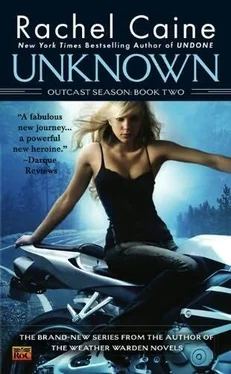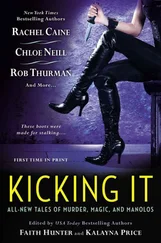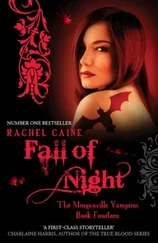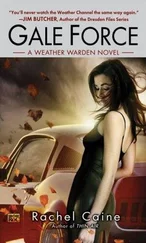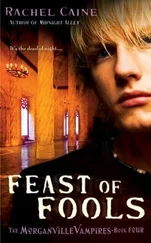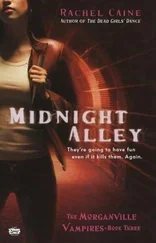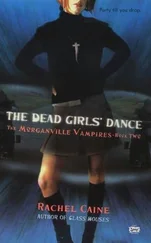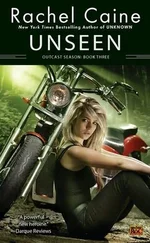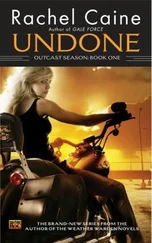I continued to smile as the hot breeze blew in through the open window, washing away the stench of burning food. “Then how is it that I like pie?” I asked him. “Or that I like you?”
“Hey, I’m not a little thing. Don’t you go spreading that rumor.”
“Everything is small,” I said, and my smile faded.
“Everything. Even me.” The memory of that brush of the Mother’s touch ached inside me, woke needs that had slept since I’d been cast down into human flesh. I wanted, needed . . .
Luis took my hand in his, a human touch that was irrationally comforting. “Stay with me, Cass. We’re going to find a way out of this.”
I knew the way out. I kept my gaze trained on the desert as it swept by outside my passenger window, and I tried not to think about how much destruction lay along that path to victory.
I would lose him.
I would lose them all in winning, and it would be such a fierce, cold victory. A world empty, new, swept clean of the complications of humanity. The way Pearl had swept the world clean, once. For the good of the Djinn, or so we had pretended.
It had not been worth it then. I was far from sure that it would be worth it now.
Las Vegas was a dizzying wonderland of lights that reminded me of nothing so much as the aetheric. It was filled with spinning, brilliant colors that seemed to blend one into another, too many for the eye to take in. It seemed to burst out of the ground in fantastic shapes, more a defiance of nature than its product. Where Albuquerque often seemed shaped by its environment, Las Vegas seemed to deliberately ignore the land upon which it sat.
There was a certain magnificent idiocy in that, a denial of all the reality so evident around us. Humans. I would never truly understand them, even if I survived in this body a hundred years. That made me wonder . . . would I grow old? Develop infirmities and diseases? Could I actually create life, the way humans did, to live on after my time on the Earth?
The thought made me involuntarily look at Luis, who was navigating the van through traffic with the ease of someone who was a frequent visitor to this town. He glanced back. “What are you thinking?” he asked.
“I don’t think you would want to know,” I said, very truthfully. I couldn’t imagine Luis would find it comforting to consider the prospect of a child, much less being the father of my child.
Although, if the earlier events had been at all indicative of his feelings, and not simply raw physical needs let loose by the whiskey, then . . . perhaps. But it seemed not to be the time to pursue the thought.
“Okay,” he said. “So we’re going to meet with the head guy for the Ma’at. You’re going to mind your manners, right?”
“Of course.”
From the rude noise he made, Luis evidently did not believe me. That was, perhaps, appropriate. “Just try not to destroy anything. Or make enemies out of the only real allies I’ve been able to scrounge up. It’s not like we’re neck deep in people willing to help us, you know.”
The Ma’at, from all I knew of them, were not the strongest allies that might be had in any case, and I was far from certain they were really interested in helping us. They were people who, though having some tendency toward wielding the same powers as the Wardens, had been disqualified for admission into their ranks—usually because their powers were not deemed significant enough to matter. In some cases, though, they were powerful indeed, and had somehow managed to slip through the complex net that identified potential Wardens as young adults, which meant they lived a furtive double life, and were jealous of their secrets.
The Ma’at were unique in that they had set out from the beginning to work with the Djinn—not to hold them as slaves, as the Wardens did, but to seek out those who were free and might be interested in an alliance. There were few of these, and almost all were New Djinn, not the elders like me. In fact, I knew of only one of the True Djinn who had taken such a direct interest in humanity: Venna, who often presented herself as a child when in human form. Venna was ancient and extraordinarily powerful. I suspected the child-form to be a complex sort of joke I did not fully understand.
Las Vegas burned in alien colors as we entered the main part of the city—brilliant greens, acid yellows, burning reds and pinks. The patterns and hues rippled and changed in brilliant, mesmerizing patterns, and I stared at them without blinking, fascinated by this manifestation in the physical world of what I so loved about the realms available to the Djinn. Crude it might be, but the fact that humans found this mesmerizing as well showed a connection between humanity and the Djinn that I’d never really considered.
I hardly noticed the crush of strangers passing on the streets, or the river of wheeled metal rushing around us; I hardly even noticed the stench of exhaust and rubber that never seemed far absent from these clusterings of humanity. That was a measure of how delighted I was by the triumphant blaze of light around us.
And then, quite suddenly, we were facing something that I recognized with an almost physical shock—a shock that quickly faded, because the familiarity was only a surface impression. This was not the magnificent carved Sphinx, nor the towering majesty of a pyramid; these were modern reproductions, lacking in the sophistication of those long-dead artisans, or the sanctity with which those works of religious fervor had been imbued.
These were cheap copies, packaged and sold as mere entertainment, and just for a moment the glitter of the place fell away, and I grew angry. Angry that humans valued their history so little. Angry that even their greatest achievements could be made so commonplace.
I wondered what would happen if I melted the false Sphinx into a messy heap of painted slag, and then remembered—regretfully—that I had promised Luis not to destroy anything.
Still. There was provocation. I could claim self-defense, in a way.
“Right,” he said, parking the van in one empty space in a vast field of concrete covered with neatly ordered glittering vehicles. “Please do me a favor. Keep quiet and follow my lead. And don’t start anything.”
I glared at the Sphinx. In my opinion, something had already been started.
It stared serenely past me, toward the distant horizon. That, at least, it had in common with its ancient cousin.
The lobby of the hotel was cavernous, dark, and—like the exterior—a cheap exhibition that had little to do with the history it claimed to honor. A constant chatter of chimes, coins, and voices set my nerves trembling with the need to make them all fall silent and leave me in peace, but I gritted my teeth and held on to the promise I had made to Luis. They will help, I told myself a little desperately. They will help us find Isabel.
The carpeting was thick and plush underfoot, and it had soaked up a million spilled drinks. The entire room reeked of desperation, old liquor, and cleaning fluids, although most humans wouldn’t have noticed anything at all. I tried to breathe shallowly, and balled my hands into fists. I must have seemed angry, because I noticed uniformed security men and women turning to watch our progress through the room. One lifted a small device to his lips and spoke.
Luis went to a simple phone set into an alcove; the label above it said PRIVATE USE ONLY. There were no buttons, only the handset and cradle. He picked it up, put it to his ear, and said, “Luis Rocha and Cassiel to see Charles Ashworth. We’re expected.”
Before he’d replaced the handset, one of the security men was behind us, hemming us into the alcove. Not aggressively, which was all that saved him, but certainly with unmistakable purpose.
Читать дальше
